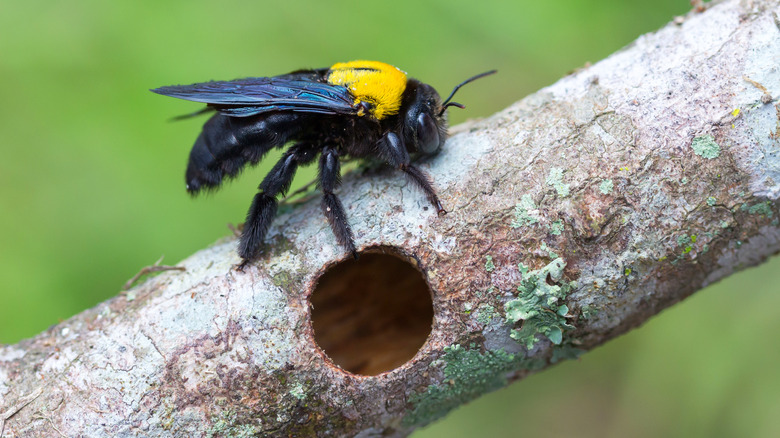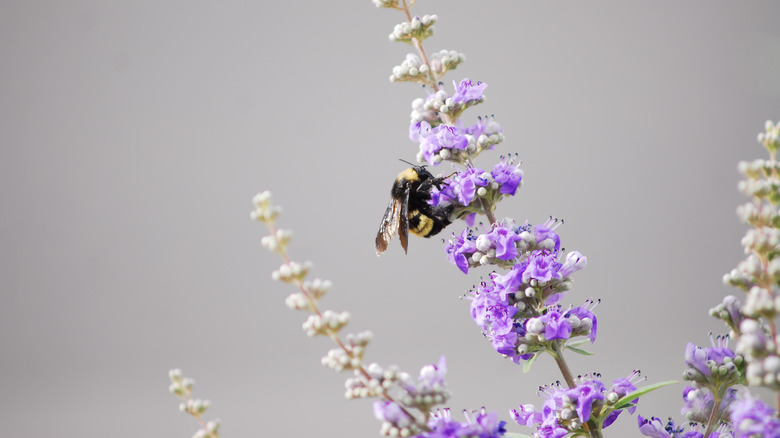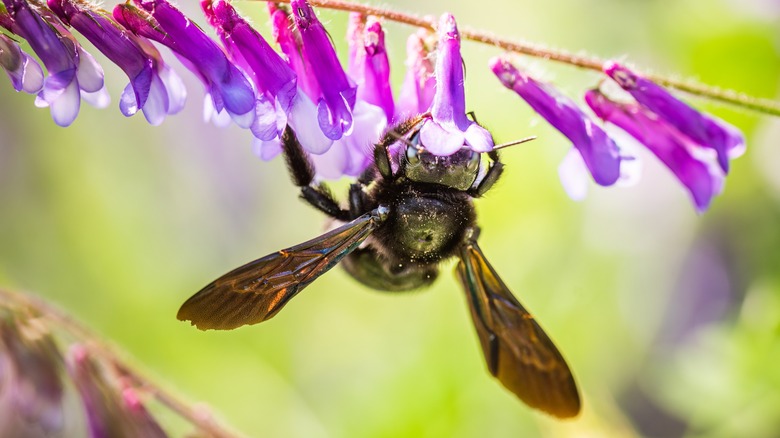How To Attract Honeybees Into Your Yard Without Luring In Carpenter Bees
Most gardeners know that pollinating bees are the backbone of our ecosystem and global food supply. We want to do what we can to create welcoming environments that make their pollinating job as easy as possible, but we would rather not attract one shady character into our yard: the carpenter bee. According to PennState Extension, carpenter bees' scientific name, Xylocopa, means woodcutter. That says it all. Carpenter bees bore holes in wood fences and decks since it's where they settle. If they decide they like that spot, they keep boring tunnels that can cause structural damage over the years. We want to repel these bees from hanging around our wood structures in the first place, which makes wooing bees into our gardens sound like it's at cross purposes to protecting our homes.
However, any refusal to do what we can to make our gardens a pollinating haven for bees is untenable at this point. The situation is dire. Bees, which the BBC reports are responsible for pollinating more than ¾ of the crops that feed 90% of the world, are dying at faster rates than ever before and are desperate for wildflower meadows that have since been shrunken into suburban manicured lawns. They need our help. Fortunately, we can develop gardens in favor of bees without suffering the ire of carpenter bee infestations. An effective solution might be easier — and more important — than you think.
Carpenter bees are pollinators too – give them alternative nesting options
Despite being troublesome, carpenter bees are pollinators, too. The USDA points out that they pollinate eggplants and tomatoes by high-frequency shimmying the pollen from those vegetable blooms. Although widespread pollinating campaigns tend to place honey bees first in line as needing rescue, that is not quite how the story goes. According to the wildlife conservation coalition Wildlife and Countryside, while honey bees are important, a diverse wild bee population is needed to reinforce the cornerstone of the health and well-being of our ecosystem. Carpenter bees play a special part in that, which means we must welcome them into our gardens, but not have them bore into our decks!
To deter carpenter bees from making your house their home, PennState Extension says the first step is to paint your wood regularly, which is a major turn-off to carpenter bees. Also, consider treating your wood with almond oil, as carpenter bees detest that scent and will steer clear. An even better deterrent is offering carpenter bees a new housing alternative. To do this, try adding an untreated pine or cedar element to your garden. This will entice carpenter bees away from your home and surrounding deck and wheedle them to construct their bee home out in the wild instead. Best Bee Brothers suggest that any softer wood — mulberry, ash, or cypress – will also do. Carpenter bees will take the easiest route to make a plank into their new home.
What to know about carpenter bees
To do our gardener's best to attract the bees while simultaneously doing our homeowner's best to protect our wood structures from carpenter bee infestations, it is helpful to know how to spy a carpenter bee in the first place. First off, they look a bit like their bumble bee cousins. Carpenter bees have a slight yellow fuzz, but on closer inspection, PennState Extension points out they have slick black bodies. These species are also notably more solitary than other bees, so your first sighting of carpenter bees will not likely be a big communal crew of buzzing bees.
Also, it may be unfair to sweepingly brand carpenter bees as the bad bee of the bunch. They are not particularly aggressive, especially compared to honeybees, says the pest control team at Amdro. Horticulture agents at Clemson University Home and Garden Information Center furthermore make the case that while a carpenter bee might buzz at you to get you to back off, the male bees, determinable by noticeable white markings on their faces, do not even sport a stinger. We do not want to vilify the bee that PennState Extension says contributes to pollinating 15% of our crops. Carpenter bees are fully content to get busy doing that work on our behalf if we give them a few good, alternative places to live, and after that, let them be.


